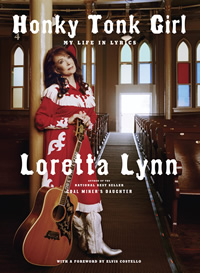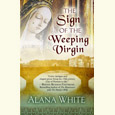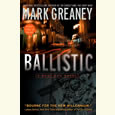Hit City
In a new memoir, Loretta Lynn recalls her own life through the lyrics of her songs
Loretta Lynn’s rise to fame epitomizes the quintessential American dream, but with a uniquely Appalachian slant. A coal miner’s daughter who was, as her number-one hit explains, “born in a cabin on a hill in Butcher Hollow,” Lynn married at thirteen and had four children by eighteen. She had six children in all and was a grandmother before she was thirty. Despite her busy home life, she has recorded sixteen number-one hits and sent seventy songs up the country charts. And at seventy-seven, she continues to write and record crafted, heartfelt songs. It’s only fitting that Loretta Lynn’s newest memoir tells the story of her life through the medium that made her famous: her songs. In Honky Tonk Girl: My Life in Lyrics, Lynn collects 300 songs, many of them glossed with anecdotes that explain their genesis.
One of the many wonderful features of this book—which also includes 105 photographs—is the chance to learn the stories behind songs like “I’m a Honky Tonk Girl,” which kick-started Lynn’s career in 1960. Lynn explains that the song was inspired by a woman who started hanging out at a honkytonk where Lynn was singing. The woman, unaccustomed to drinking, would start crying after just a couple of beers and eventually told Lynn why she was upset: her husband had left her and their seven kids for a younger woman. Like any good alchemist, Lynn knew how to take this worn-out tale and turn it into gold.
 Readers also learn that “Coal Miner’s Daughter” originally included eight additional verses and that “Fist City,” in which a wife warns another woman to leave her man alone, got its inspiration from a fight on Lynn’s own front lawn with a female schoolbus driver, who claimed to be in love with Lynn’s husband Doolittle. “Me and her and Doo met in our yard one day when I came in off tour,” Lynn explains, “and let’s just put it this way: she didn’t stay very long.” There are some terrific anecdotes here, and perhaps the only flaw in the collection is that there aren’t more of them.
Readers also learn that “Coal Miner’s Daughter” originally included eight additional verses and that “Fist City,” in which a wife warns another woman to leave her man alone, got its inspiration from a fight on Lynn’s own front lawn with a female schoolbus driver, who claimed to be in love with Lynn’s husband Doolittle. “Me and her and Doo met in our yard one day when I came in off tour,” Lynn explains, “and let’s just put it this way: she didn’t stay very long.” There are some terrific anecdotes here, and perhaps the only flaw in the collection is that there aren’t more of them.
Lynn has long been known for writing about whatever she feels—holding nothing back. As she told Chapter 16 in a 2010 interview, “With every song I’ve ever written, there’s a part of me in it.” This is the trait that helped listeners identify with her songs in the first place. It is also a trait that continues to serve her well, to make her work continue to feel new and surprising.
When Lynn sings in “Fist City” that the would-be home wrecker needs to “detour round my town / ‘cause I’ll grab you by the hair of the head and I’ll lift you off the ground,” there is no sense of self-consciousness or self-doubt. She doesn’t wonder if perhaps her ire should be directed at her own husband instead, or whether marital counseling would better serve her ultimate aims than physical threats. Nope. That’s not what Lynn does. In fact, in the anecdote accompanying this song, she spends more time recalling her surprise that a woman could be employed as a bus driver than that her husband might cheat. In doing so, she seems to reveal much more of herself than she thinks she is revealing. And part of her charm lies in this very fact.
Reading Honky Tonk Girl: My Life in Lyrics straight through, as one would read a book of poems, reveals a surprising truth. Most lyrics would fall flat without the accompanying music. Not so Loretta Lynn’s. In fact, reading them does just the opposite: it confirms Lynn’s place as a songwriter who can not only express her emotions but also hone those emotions into well-crafted songs. Who can forget the hook of “Don’t come home a drinkin’ with lovin’ on your mind”? Or, “Everybody knows I’m dead so why don’t they close my eyes?”
 This collection also affirms the part Lynn played in expanding women’s roles. Yes, she was the first woman to be named Entertainer of the Year by the Country Music Association. But that’s simply the award that sums up her work. The details that earned her the award are much more interesting. Lynn was a working mother of six and the family breadwinner. Lynn was actually more of a “stand by your man” sort of woman than her friend Tammy Wynette was. (As one song explains: “I guess you think I’m crazy but it keeps him here with me / And I only see the things I wanna see.”) But her songs explore the connections between sex, power, and gender in a way that is honest, complex, and real.
This collection also affirms the part Lynn played in expanding women’s roles. Yes, she was the first woman to be named Entertainer of the Year by the Country Music Association. But that’s simply the award that sums up her work. The details that earned her the award are much more interesting. Lynn was a working mother of six and the family breadwinner. Lynn was actually more of a “stand by your man” sort of woman than her friend Tammy Wynette was. (As one song explains: “I guess you think I’m crazy but it keeps him here with me / And I only see the things I wanna see.”) But her songs explore the connections between sex, power, and gender in a way that is honest, complex, and real.
Embedded in her lyrics, for example, are critiques of the inequalities she observed in sexual relationships of the sixties and early seventies. “Since I’ve Got the Pill,” released in 1975 on the album Back to the Country, discusses the power shift in a couple’s relationship that comes with reliable birth control: “This chicken’s done tore up her nest / And I’m ready to make a deal / And you can’t afford to turn it down / ‘Cause you know I’ve got the pill.” The assertive tone implies that this is more than a physical change. A woman who can control her own body gains emotional power and can now offer a “deal” that the man can’t refuse. Another song, “Adam’s Rib,” might sum it up best: “From Adam’s rib to woman’s lib / We’ve come a long way from cookin’ and rockin’ the crib.”
In the book’s forward, Elvis Costello situates the singer in terms of her past accomplishments and also her present ambitions. At age seventy-seven, she is gassing up the tour bus and heading out this summer. And she is engaged in a couple of interesting collaborations, recording “Every Rose Has Its Thorns” with Poison’s Bret Michaels and writing with Elvis Costello. A must-have for any fan, Honky Tonk Girl: My Life in Lyrics reminds us why we fell in love with her to begin with. And for those who aren’t already fans of Loretta Lynn, this collection of lyrics will make it clear why they should be.
Charlotte Pence is a poet and the editor of The Poetics of American Song Lyrics. Loretta Lynn will appear at the Ryman Auditorium on May 10 at as part of Opry Country Classics.


